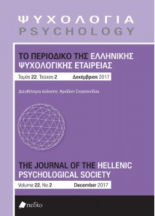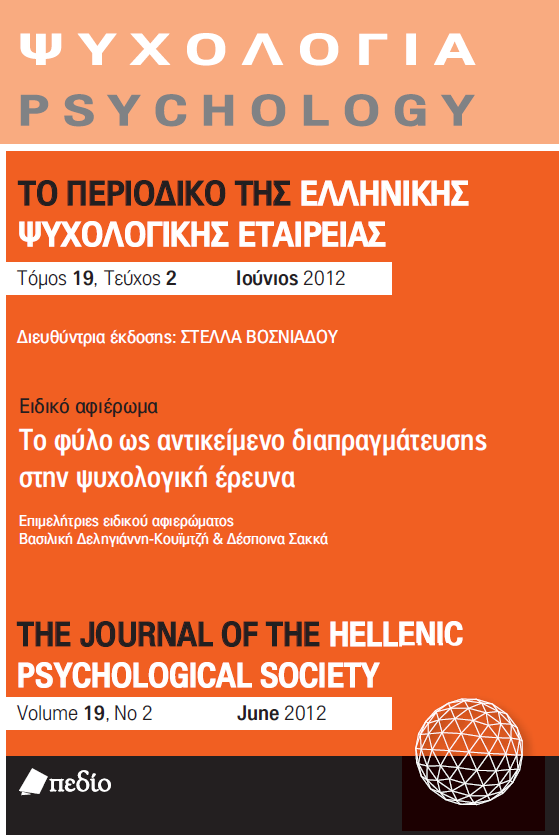Η διαθεματικότητα ως απόθεμα των ερευνητ(ρι)ών και των συμμετεχουσών/όντων: σχολιασμός των συνεισφορών στο Ειδικό Τεύχος

Περίληψη
Ο στόχος αυτού του σχολίου είναι να συσχετίσει τις εργασίες που συνεισφέρουν σε αυτό το ειδικό τεύχος με τις ευρύτερες κατευθύνσεις και προσανατολισμούς της ψυχολογικής έρευνας για τη διαθεματικότητα. Υποστηρίζεται ότι, από κοινού με την υπάρχουσα ψυχολογική έρευνα, οι συνεισφορές στο παρόν τεύχος είτε διερευνούν πώς οι κοινωνικοί φορείς αναπαριστούν στερεοτυπικά τις/τους άλλους υπό το πρίσμα των διασταυρούμενων κοινωνικών ταυτοτήτων τους είτε επικεντρώνονται στις πιθανές ψυχολογικές και κοινωνικές επιπτώσεις της υπαγωγής σε υποτιμημένες διαθεματικές κατηγορίες και ταυτότητες (συμπεριλαμβανομένου του φύλου). Υποστηρίζεται επίσης ότι ενώ η διαθεματικότητα αποτελεί κυρίως μέλημα και αναλυτικό φακό των ερευνητ(ρι)ών, η μελλοντική ερευνητική ατζέντα, όπως υποδεικνύεται και από ορισμένες από τις μελέτες που συνεισφέρουν, θα πρέπει να περιλαμβάνει τη μελέτη της διαθεματικότητας ως μελήματος και αποθέματος των συμμετεχουσών/όντων και τη διερεύνηση των (εγγύς και απομακρυσμένων) επιπτώσεων της χρήσης της σε διαφορετικά κοινωνικά και ρητορικά πλαίσια.
Λεπτομέρειες άρθρου
- Πώς να δημιουργήσετε Αναφορές
-
Φίγγου Λ. (2023). Η διαθεματικότητα ως απόθεμα των ερευνητ(ρι)ών και των συμμετεχουσών/όντων: σχολιασμός των συνεισφορών στο Ειδικό Τεύχος. Ψυχολογία: το περιοδικό της Ελληνικής Ψυχολογικής Εταιρείας, 28(1), 116–121. https://doi.org/10.12681/psy_hps.34686
- Ενότητα
- ΕΙΔΙΚΟ ΑΦΙΕΡΩΜΑ

Αυτή η εργασία είναι αδειοδοτημένη υπό το Creative Commons Attribution-ShareAlike 4.0 International License.
Το περιοδικό ΨΥΧΟΛΟΓΙΑ έχει υιοθετήσει μία πολιτική Platinum open-access. Τα έξοδα υποβολής, επεξεργασίας ή δημοσίευσης των εργασιών καλύπτονται από την Ελληνική Ψυχολογική Εταιρεία. Τα πνευματικά δικαιώματα των δημοσιευμένων εργασιών προστατεύονται από την άδεια 'Creative Commons Attribution-ShareAlike 4.0 International'. Οι Συγγραφείς διατηρούν τα Πνευματικά Δικαιώματα και χορηγούν στο περιοδικό το δικαίωμα της πρώτης δημοσίευσης. Η άδεια αυτή επιτρέπει σε τρίτους, να χρησιμοποιούν την εργασία σε οποιαδήποτε μορφή, με την προϋπόθεση της διατήρησης των διατυπώσεων που προβλέπονται στην άδεια σχετικά με την αναφορά στον αρχικό δημιουργό και την αρχική δημοσίευση στο περιοδικό ΨΥΧΟΛΟΓΙΑ. Επιπλέον, κάθε διανομή της εργασίας οφείλει να γίνεται με τους ίδιους όρους διανομής, δηλαδή με την ίδια άδεια Creative Commons.






